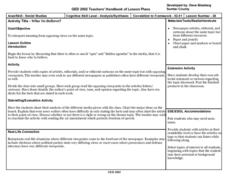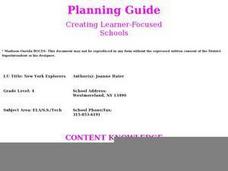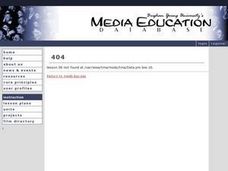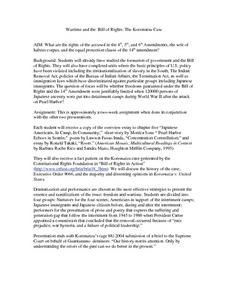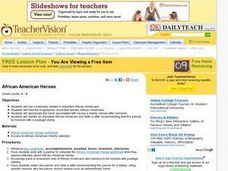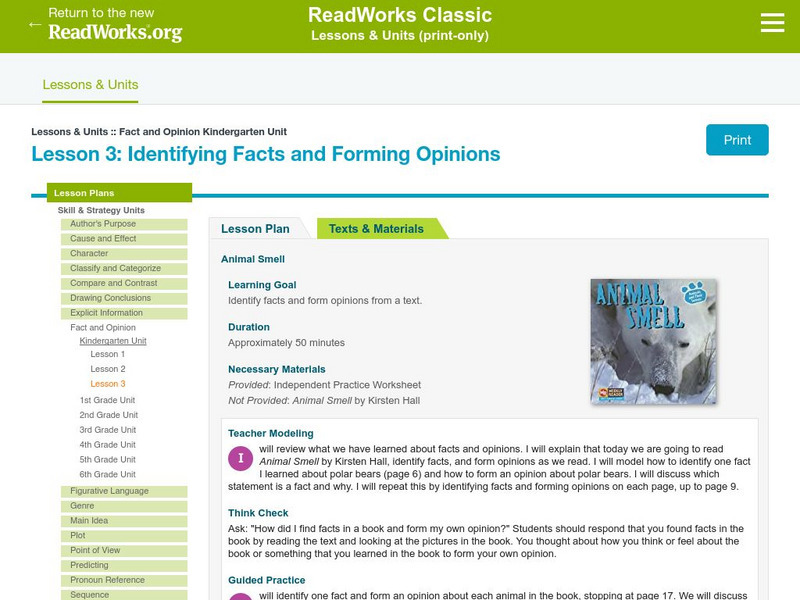Curated OER
Who To Believe?
Students interpret meaning from opposing views on the same topic, and discuss that there is often so much "spin" and "hidden agendas" in the media.
Curated OER
New York Explorers
Fourth graders investigate the early explorers of New York state. They identify their country of origin, reason for exploration, and the results. They produce a PowerPoint based on their results.
Curated OER
Interviewing
Students practice their interviewing skills in this lesson. Using the internet, they plan for the interview process and could be used in their overall project. They must decide what information they want to get out of their interview and...
Curated OER
Author, Author!
Third graders, in groups, select and research a favorite studenT author or illustrator. They answer questions about the author, conduct research and prepare a PowerPoint presentation with their findings.
Curated OER
Lesson 5: Publication After the Interview
Students lear about the publishing/writing process such as the outline, rough draft, MLA Guide for listing sources, and evaluating, revising, and proofreading.
Curated OER
Magazine Sales Talks
Students role-play to determine the best types of magazines that should be purchased for their media center. They create a sales presentation for a particular magazine in small groups. As they listen to each presentation they evaluate...
Curated OER
Immigration in Massachusetts, 1880-1920
Learners, in groups, research immigration in America at the turn of the century. They put together a series of original written essays, letters, newspaper columns, etc. that show what it was like to live as an American citizen and as an...
Curated OER
Social Studies: Heroes in American Culture
Students examine heroes and discuss their characteristics, values, and actions. They produce Powerpoint presentations on real-life and fictional heroes. Students interview veterans for an oral history project.
Curated OER
When You Put It All Together!
Students review information from variety of news sources found on the Internet, and compare and contrast the information.
Curated OER
Comparing and Contrasting Ancient Civilizations
Students research the ancient civilizations of Rome, India, Greece, and Egypt. They conduct Internet research, compare/contrast aspects of each culture, and create a Powerpoint presentation.
Curated OER
What Makes a Shadow?
Second graders respond to language, meanings and ideas in different explanatory texts relating them to personal experiences. They listen to and interact with others. Ask questions and talk about personal experiences in a group.
Curated OER
Holes
Learners watch the movie Holes. They list 5 key events from Holes and use a pyramid to rank the events in order of importance to the story. They determine cultural differences between the character and themselves.
Curated OER
Political Cartoons: Thinking Broadly, Communicating Succinctly
High schoolers think broadly about the tsunami disaster and its aftermath through studying cartoons. Students critically think about the literary devices the authors/artists use, such as satire, metaphor and personification.
Curated OER
Creative Writing
Eleventh graders write a persuasive letter to the editor using the writing process.
Curated OER
Independent - To Be or Not Top Be - Day 1, Lesson B: To Arms!
Fifth graders explore the verbal and non-verbal parts of an oral presentation.
Curated OER
Scavenger Hunt
Students search for items in various parts of the newspaper noting the different types of information it provides.
Curated OER
Body and Media #2
Students discover how media influences body image. They identify how the media creates an ideal beauty. They answer questions after watching "Dying to be Thin".
Curated OER
Wartime and the Bill of Rights: The Korematsu Case (Lesson 2)
Twelfth graders review how the government and Bill of Rights came into effect. Using primary source documents, they discuss if Japanese rights were violated when they were placed in internment camps after the bombing of Pearl Harbor. ...
Curated OER
African-American Heroes
Students explore websites about famous African-Americans. They work in pairs to decide on an African American who should be honored with a stamp. They write a letter recommending this person for a stamp including appropriate reason why...
Curated OER
Looking After Pets
Students work in groups to compose their own "Duty of Care" for pets and make their own individual list from this discussion and illustrate it with drawing or images taken from magazines, websites or newspapers.
Curated OER
Geography: Islands and Alcatraz
Pupils, in groups, create maps of islands including map keys and compass roses. They compare and contrast their island communities with that of the island prison, Alcatraz. Students select from a series of projects, including writing...
Curated OER
The Dialogues of Difference
Students research the 1067 Newark riots and examine photographs of the riots for clues as to when they were taken and what was going on. They view different historical perspectives on the riots and then write dialogues based on the...
Read Works
Read Works: Lessons: Lesson 3: Identifying Facts and Forming Opinions
[Free Registration/Login Required] A lesson plan and materials to teach kindergarten students identify facts and form opinions using the book Animal Smell.
Texas Education Agency
Texas Gateway: Differentiate Substantiated and Unsubstantiated Opinions in Text
[Accessible by TX Educators. Free Registration/Login Required] In this lesson, students will learn to differentiate fact from opinion and to decide whether an opinion is substantiated or not.
Other popular searches
- Reading Fact and Opinion
- Fact vs. Opinion Reading
- Reading Fact or Opinion
- Fact vs Opinion Reading
- Fact and Opinion in Reading


